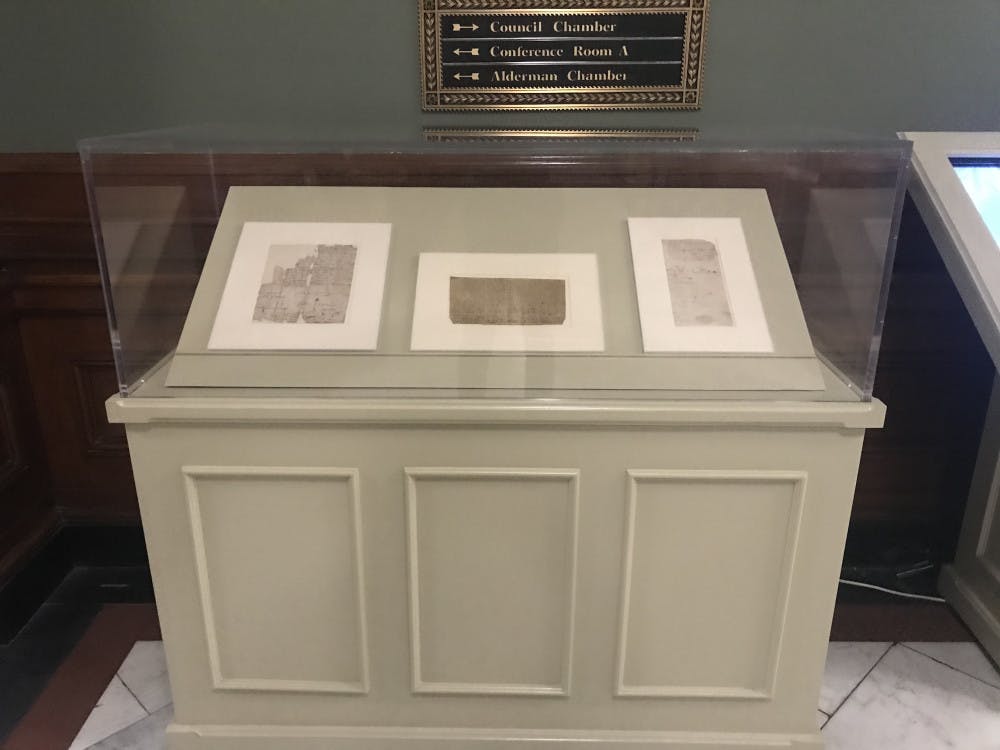In 2011, while rummaging through a box labeled “To be indexed” in the dusty attic of City Hall, then-City Archivist Paul Campbell stumbled upon the 1648 Town Charter for the city of Providence — written on a piece of lamb vellum the size of a paperback book. Until then, the document had been thought lost to history.
Nearly a decade later, the charter has found a new home in City Hall, along with two other founding documents of the city. The 1637 Providence civil compact, the 1638 deed to Providence and the 1648 town charter were united for the first time Feb. 18 as part of a new display outside of the City Council chambers. The deed to Providence was formerly displayed in the Rhode Island State House.
Caleb Horton, the current Providence city archivist, helped organize the new display. “These things need to be shown to people,” he said. “They can’t just hide upstairs.”
The civil compact is a commitment by the citizens of Providence to govern with a separation between church and state; the agreement was the first of its kind in Colonial America.
The deed to Providence details the official purchase of land by Roger Williams from the Narragansett Native American tribe. Williams arranged a formal legal agreement under English law.
The town charter made Providence a township within the colony that would eventually become Rhode Island: Providence Plantation. Williams had returned to England in 1643 and succeeded in persuading Parliament to combine Providence, Portsmouth and Newport into a single colony.
These documents, now nearly 400 years old, are presented alongside a digital kiosk offering transcriptions of the documents and relevant historical background in English and Spanish.
“Through the assistance of 21st century technology, every Providence resident of every walk of life, age and language can be proud of the documents that began our story,” said Mayor Jorge Elorza in a press release.
City Council President Sabina Matos — the first Latina City Council President in Providence history — highlighted the accessibility afforded by these Spanish transcriptions in an email to The Herald.
“As an immigrant who moved to this country just 20 years ago this year, and as a non-native English speaker, I felt that it was very important that we share our City’s important story so that the majority of our residents would have access to the documents that shaped who we are,” Matos wrote.
Horton suggested that “Providence has always been a city of sanctuary.” He noted that “Roger Williams settled here because he had to — he was basically a refugee.” Williams established Providence after he was expelled from the Puritan Massachusetts Bay Colony for his support of separation between church and state.
Shaina Weintraub is the reference and multimedia administrator for the City Archives, and also runs the Archives’ social media accounts. She says that it is important to bring history to people in a “fun and engaging way.”
“People don’t want to have to read a whole book,” she said. “They want to get the gist of something.” Weintraub says the digital kiosk serves this purpose.
“We tried to write (the background information) in a way (that) people can really understand it,” Horton said.
Horton hopes that the city’s residents will take note of the message of tolerance within the documents. “Seeing (the documents) makes me proud, and I think the goal is to make other people proud of this city,” he said.

Ben Glickman was the 132nd editor-in-chief and president of The Brown Daily Herald. He previously served as a metro editor and oversaw the College Hill and Fox Point beat, in addition to writing and editing about city politics, COVID-19 and the 2020 election. He is the co-creator of the Bruno Brief, The Herald's first news podcast. In his free time, he is passionate about birds (also tweeting) and eating way too spicy food.





